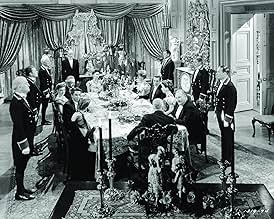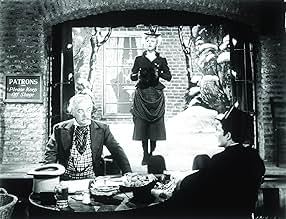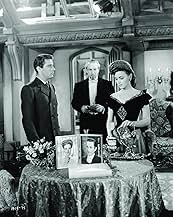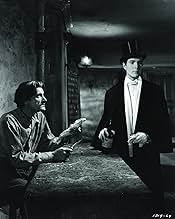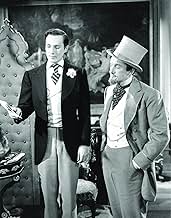NOTE IMDb
7,5/10
15 k
MA NOTE
Un jeune homme corrompu parvient curieusement à garder sa beauté juvénile, mais un tableau spécial révèle progressivement sa laideur intérieure.Un jeune homme corrompu parvient curieusement à garder sa beauté juvénile, mais un tableau spécial révèle progressivement sa laideur intérieure.Un jeune homme corrompu parvient curieusement à garder sa beauté juvénile, mais un tableau spécial révèle progressivement sa laideur intérieure.
- Récompensé par 1 Oscar
- 3 victoires et 4 nominations au total
Renee Carson
- Young French Woman
- (as Renie Carson)
Lilian Bond
- Kate
- (as Lillian Bond)
Devi Dja
- Lead Dancer
- (as Devi Dja and Her Balinese Dancers)
Histoire
Le saviez-vous
- AnecdotesOscar Wilde's Dorian was blond-haired, blue-eyed, and highly emotional, but Writer and Director Albert Lewin's conception of Dorian was of an icy, distant character.
- GaffesAt approximately 34:35 into the film, the time on the clock in the room suddenly changes from just after 2 o'clock to 3 o'clock. Then at approximately 37:00 it moves back to 2:05 and then to 2:09 as Dorian continues to play the piano.
- Citations
Lord Henry Wotton: "If I could get back my youth, I'd do anything in the world except get up early, take exercise or be respectable."
- Versions alternativesSome prints are slightly edited, omitting Dorian's prayer and Lord Henry's line, "Heaven forgive me" in the final scene.
- ConnexionsFeatured in The Cinematographer (1951)
- Bandes originalesGood-Bye, Little Yellow Bird
(uncredited)
Lyrics and Music by C.W. Murphy and William Hargreaves
Performed by Angela Lansbury
Commentaire à la une
Based on a story by Oscar Wilde, The Picture of Dorian Gray tells the story of a man that sells his soul for eternal youth. After having his portrait done, Dorian Gray, under the influence of the eloquent Lord Henry Wotton, wishes for the picture to age instead of him so that he may be blessed with eternal youth. After the death of his wife-to-be, Dorian embarks on a life of pleasure and sins, which don't affect the man in the slightest, but leaves it mark on the portrait which descends into a horrid impression of the handsome young man it's portraying...
This film is fantastically well put together. The acting, directing and writing are all stellar, which make this film one pleasant viewing indeed. The real plaudits for this movie, however, go to the writer of the original novel; Oscar Wilde. The story itself is ingenious. Of course, the idea of selling one's soul had been done before (the German legend, Faust, springs to mind instantly), but never in this way. The portrait itself is a genius idea and it allows us to see the man and the sin as different things. However, through it's ending; it also allows the audience to see that the two are linked, and overall giving a good commentary on body, soul and sin. The story has obvious themes of vanity and the lust for eternal youth entwined within it, both of which are sins in themselves. The main character of Dorian Gray is a man that is a victim of influence, and we can feel for him in that way; but he's also an ugly sinner on the inside, making the audience hate him. This is a strange situation for an audience to be in, and in the end; all that's left for him is indifference.
The film moves slowly, but this is definitely to it's advantage as it allows us to get to know the characters, and if it wasn't for that the horror wouldn't be able to work as it needs our emotional impact to function. The horror in the story is rather subdued, but this is one of the most horrific tales ever told. I think most people will agree that this kind of horror - the brooding, personal kind - is much more horrifying than anything that men with knives and any amount of jumpy moments can muster.
This film is fantastically well put together. The acting, directing and writing are all stellar, which make this film one pleasant viewing indeed. The real plaudits for this movie, however, go to the writer of the original novel; Oscar Wilde. The story itself is ingenious. Of course, the idea of selling one's soul had been done before (the German legend, Faust, springs to mind instantly), but never in this way. The portrait itself is a genius idea and it allows us to see the man and the sin as different things. However, through it's ending; it also allows the audience to see that the two are linked, and overall giving a good commentary on body, soul and sin. The story has obvious themes of vanity and the lust for eternal youth entwined within it, both of which are sins in themselves. The main character of Dorian Gray is a man that is a victim of influence, and we can feel for him in that way; but he's also an ugly sinner on the inside, making the audience hate him. This is a strange situation for an audience to be in, and in the end; all that's left for him is indifference.
The film moves slowly, but this is definitely to it's advantage as it allows us to get to know the characters, and if it wasn't for that the horror wouldn't be able to work as it needs our emotional impact to function. The horror in the story is rather subdued, but this is one of the most horrific tales ever told. I think most people will agree that this kind of horror - the brooding, personal kind - is much more horrifying than anything that men with knives and any amount of jumpy moments can muster.
Meilleurs choix
Connectez-vous pour évaluer et suivre la liste de favoris afin de recevoir des recommandations personnalisées
Détails
- Date de sortie
- Pays d’origine
- Site officiel
- Langue
- Aussi connu sous le nom de
- The Picture of Dorian Gray
- Lieux de tournage
- Société de production
- Voir plus de crédits d'entreprise sur IMDbPro
Box-office
- Budget
- 3 500 000 $US (estimé)
- Durée1 heure 50 minutes
- Couleur
- Rapport de forme
- 1.37 : 1
Contribuer à cette page
Suggérer une modification ou ajouter du contenu manquant

Lacune principale
By what name was Le Portrait de Dorian Gray (1945) officially released in India in English?
Répondre

